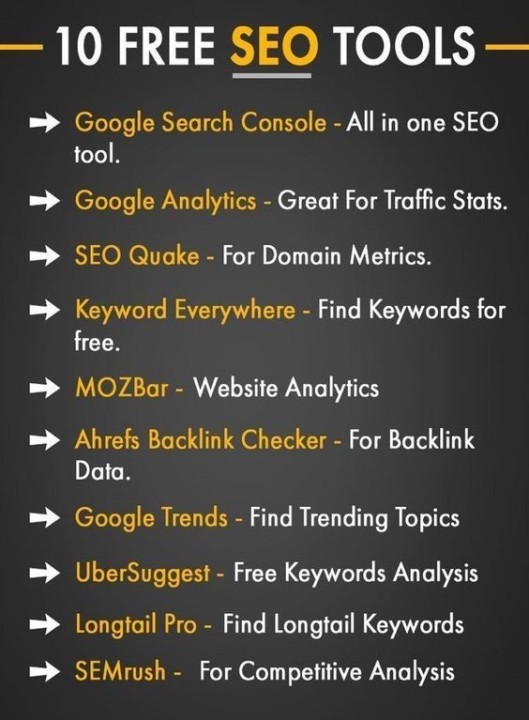Introduction
Search Engine Optimization (SEO) is essential for driving organic traffic, improving visibility, and boosting conversions. But mastering SEO doesn’t always require expensive tools. In fact, there’s a wide range of top free SEO tools that offer powerful features for keyword research, technical audits, backlink analysis, and content optimization.
Whether you’re a solo marketer, a startup founder, or part of a digital agency, this guide will walk you through the top free SEO tools every marketer should consider using—and how to get the most out of them.
Why Use Free SEO Tools?
Before diving into the list, let’s explore why free tools are worth your time:
- Cost-effective: Ideal for small businesses and freelancers.
- Feature-rich: Many free tools offer premium-level functionality.
- Learning-friendly: Great for beginners to understand SEO fundamentals.
- Complementary: Can be used alongside paid tools for a more robust strategy.
1. Google Search Console
What It Does:
Google Search Console (GSC) helps you monitor your website’s performance in Google search results.
Key Features:
- Track keyword rankings
- Monitor indexing issues
- Submit sitemaps
- Identify mobile usability problems
- Analyze click-through rates (CTR)
Why It’s Essential:
GSC provides direct insights from Google, making it a must-have for any SEO strategy.
2. Google Analytics
What It Does:
Google Analytics tracks website traffic, user behavior, and conversion data.
Key Features:
- Audience segmentation
- Traffic source analysis
- Bounce rate and session duration
- Goal tracking and funnel visualization
Why It’s Essential:
Combining Google Analytics with GSC gives you a complete picture of your SEO performance.
3. Google Keyword Planner
What It Does:
Originally designed for Google Ads, this tool is excellent for keyword research.
Key Features:
- Discover keyword ideas
- Analyze search volume
- Understand competition levels
- Group keywords by theme
Why It’s Essential:
It’s a reliable source for keyword data straight from Google.
4. Bing Webmaster Tools
What It Does:
Similar to GSC, Bing Webmaster Tools helps you optimize for Bing search.
Key Features:
- Keyword research
- Backlink analysis
- Site scan for technical issues
- Indexing insights
Why It’s Essential:
Bing still holds a significant share of search traffic, especially in certain demographics.
5. Yoast SEO (for WordPress)
What It Does:
Yoast SEO is a plugin that helps optimize your WordPress content for search engines.
Key Features:
- On-page SEO analysis
- Readability checks
- Meta tag customization
- XML sitemap generation
Why It’s Essential:
It simplifies SEO for content creators and bloggers using WordPress.
6. Ubersuggest (Free Version)
What It Does:
Created by Neil Patel, Ubersuggest offers keyword research, site audits, and backlink data.
Key Features:
- Keyword suggestions
- Domain overview
- Top SEO pages
- Backlink analysis
Why It’s Essential:
It’s beginner-friendly and offers a generous free tier.
7. AnswerThePublic
What It Does:
This tool visualizes search queries and questions people ask around a keyword.
Key Features:
- Content idea generation
- Long-tail keyword discovery
- Visual keyword maps
Why It’s Essential:
Perfect for creating content that answers real user questions.
8. Screaming Frog SEO Spider (Free Version)
What It Does:
A desktop-based crawler that audits your website for technical SEO issues.
Key Features:
- Broken link detection
- Redirect analysis
- Meta data review
- Sitemap generation
Why It’s Essential:
The free version crawls up to 500 URLs—ideal for small websites.
9. GTmetrix
What It Does:
GTmetrix analyzes your website’s speed and performance.
Key Features:
- Page load time
- Core Web Vitals
- Recommendations for optimization
- Waterfall breakdown of requests
Why It’s Essential:
Site speed is a ranking factor—GTmetrix helps you stay fast.

10. Google PageSpeed Insights
What It Does:
Provides performance scores and suggestions for desktop and mobile.
Key Features:
- Core Web Vitals
- Speed index
- Optimization tips
Why It’s Essential:
Directly reflects Google’s performance standards.
11. SEOptimer
What It Does:
A quick SEO audit tool that grades your site’s performance.
Key Features:
- On-page SEO analysis
- Mobile usability
- Security checks
- Social media integration
Why It’s Essential:
Great for quick audits and client reports.
12. MozBar
What It Does:
A browser extension that shows SEO metrics on the fly.
Key Features:
- Domain Authority (DA)
- Page Authority (PA)
- Keyword difficulty
- SERP analysis
Why It’s Essential:
Useful for competitive analysis while browsing.
13. Ahrefs Webmaster Tools
What It Does:
Ahrefs offers a free version of its powerful SEO suite for site owners.
Key Features:
- Site audit
- Backlink analysis
- Organic keyword tracking
Why It’s Essential:
Ahrefs is known for its backlink data—this free version is a goldmine.
14. Keyword Surfer
What It Does:
A Chrome extension that shows keyword data directly in Google search results.
Key Features:
- Search volume
- Related keywords
- On-page data
Why It’s Essential:
Speeds up keyword research without leaving your browser.
15. CanIRank
What It Does:
Helps you determine whether you can rank for a specific keyword.
Key Features:
- Keyword difficulty
- Competitive analysis
- Content recommendations
Why It’s Essential:
Ideal for small businesses and niche websites.
16. Schema Markup Generator (by Merkle)
What It Does:
Generates structured data for rich snippets.
Key Features:
- JSON-LD schema creation
- Supports multiple content types
- Easy copy-paste integration
Why It’s Essential:
Structured data improves visibility in search results.

17. Local SEO Tools (BrightLocal Free Tools)
What It Does:
BrightLocal offers free tools for local SEO audits and citation checks.
Key Features:
- Local search grid
- Citation tracker
- Google My Business audit
Why It’s Essential:
Crucial for businesses targeting local customers.
18. Google Trends
What It Does:
Shows search interest over time for keywords and topics.
Key Features:
- Trend comparison
- Regional interest
- Related queries
Why It’s Essential:
Helps you create timely and relevant content.
19. SERPsim
What It Does:
Simulates how your page will appear in Google search results.
Key Features:
- Title and meta description preview
- Pixel length checker
Why It’s Essential:
Ensures your meta tags are optimized for visibility.
20. Robots.txt Tester (Google)
What It Does:
Tests your robots.txt file to ensure proper indexing.
Key Features:
- Crawlability check
- Syntax validation
Why It’s Essential:
Prevents accidental blocking of important pages.
How to Choose the Right Tools
Consider Your Goals:
- Content creation: Use AnswerThePublic, Keyword Planner
- Technical SEO: Use Screaming Frog, GTmetrix
- Backlink analysis: Use Ahrefs Webmaster Tools, Ubersuggest
- Local SEO: Use BrightLocal, Google My Business
Combine Tools for Full Coverage:
No single tool does it all. Combine multiple free tools to cover keyword research, technical audits, and performance tracking.
Conclusion
Free SEO tools are more powerful than ever. Whether you’re optimizing a blog, managing an e-commerce site, or running a local business, these tools can help you improve rankings, drive traffic, and grow your brand—without spending a dime.
Start by picking 3–5 tools that align with your goals, and build your SEO workflow around them. As your needs grow, you can always upgrade to paid versions or integrate additional tools.





